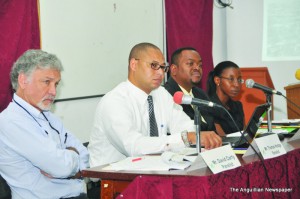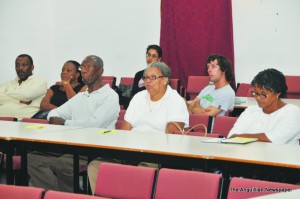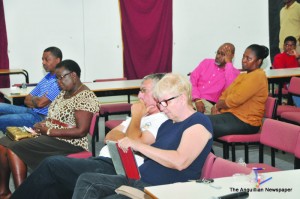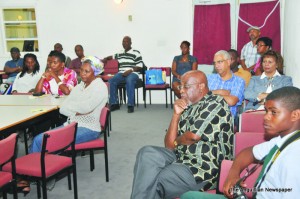
The panel discussion on “The Impact of Renewable Energy Technology on Sustainable Tourism”, held at the Teachers’ Resource Centre on Monday evening, showed that there is a growing interest in alternative forms of energy. This was evidenced by the number of persons in attendance and the interest they demonstrated during the discussion.
The event, part of theAnguillaCommunity Collegeweek of activities, began with introductory remarks by Dean of the College, Bernard Wattley. “This discussion could not have come at a more opportune time, when both renewable energy technology and sustainable tourism,are burning issues locally, regionally and internationally,” he said.

He also noted that it was a time “when so much attention is being paid to the viability of alternative energy sources, and with the Anguilla Electricity Company demonstrating a proactive stance by offering consumers mechanisms for monitoring electricity.” He stressed that “it would be foolhardy of us to turn a blind eye, or a deaf ear, to these very critical issues” which also include the debate on the European-imposed Air Passenger Duty.
The Moderator was Dr. Leroy Hill, a Graduate Teacher at the Albena Lake-Hodge Comprehensive School with special skills in e-learning.

The panelists wereShellecia Brooks, Research Officer in the Ministry of Finance, Economic Development Tourism, and a participant in the drafting of the Sustainable Tourism Master Plan 2010-2020; David Carty, a member of the Energy Committee; and Thomas Hodge, General Manager of the Anguilla Electricity Company (ANGLEC), with a strong knowledge of Renewable Energy Technology.
Mr. Hodge said examples of renewable sources of energy included solar energy, geothermal energy, wind energy and other natural energy replenishing sources. He noted thatAnguillawas now in the process of making legislative changes with a view to allowing renewable energy integration within the electricity supply. “This process involves consultation with the general public, ANGLEC and other stakeholders and that process is being handled by an independent consultant,” he said. “ANGLEC is on the right track so ‘where there is a will, there is a way’. We have the will and we have the way. We hope that in five years’ time we will use much more renewable energy inAnguilla.”

David Carty said thatAnguillawas importing eight million gallons of gasoline and diesel each year at a cost of almost fifty million US dollars shared between ANGLEC, (the biggest consumer) and the vehicles on the island.
“Although the topic, is very topical, I argue the point that unless we deal with this issue realistically, radically, with a visionary view of the future, Anguilla’s sustainability is threatened, not just Anguilla’s tourism.”
Mr. Carty went on: “You cannot divorce this issue that facesAnguillatoday without understanding the world which is so dependent on oil that it is frightening. And what’s frightening about it is that the growth of consumption globally for oil is exponential. What’s also frightening is the fact that oil is a finite resource. What’s even more frightening is that the price of oil is dependent on not just availability, demand and supply, but also all sorts of political and environmental issues.”
He said that his concern was that “unless Anguilla turns seriously to renewable energy…we are heading for a train wreck; and I do not seeAnguilla’s economy being sustainable in the next ten years if we do not change – and change big time.”
On that point, Mr. Hodge, speaking on behalf of ANGLEC, said there were two strategies in place relating to Mr. Carty’s concern. One was very large utility projects with the potential of developing a [renewable] resource of energy to feed into the ANGLEC system; and the other was the construction of wind farms. He explained that it all depended on the legislation which was about to be finalised.
Ms. Brooks was asked her views on sustainable tourism, and how it was impacted by renewable energy. In part, she defined sustainable tourism as development which had a low level impact on the environment, culture and the economy, while providing a positive experience for tourism partners.
She said tourism was an important contributor to climate change through its consumption of fossil fuels and resulting greenhouse gas emissions. She stated that inAnguillaimported fossil fuels were primarily being used while there were sources of renewable energy in abundance.
The presentations of the panelists were followed by an active period of discussion involving the presenters and members of the audience.








